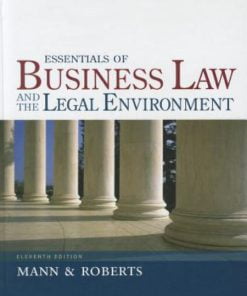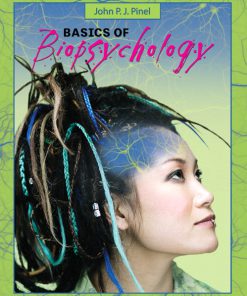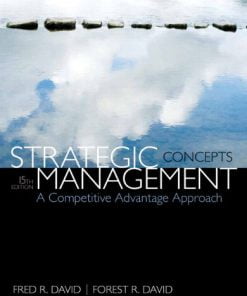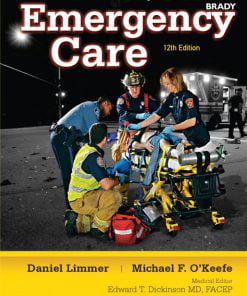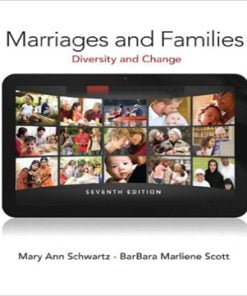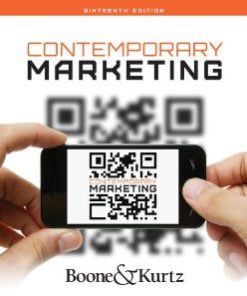Test Bank for Educational Psychology Developing Learners, 7th Edition : Omrod
$35.00 Original price was: $35.00.$26.50Current price is: $26.50.
Test Bank for Educational Psychology Developing Learners, 7th Edition : Omrod
Instant download Test Bank for Educational Psychology Developing Learners, 7th Edition: Omrod pdf docx epub after payment.
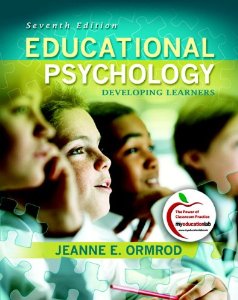
Product details:
- ISBN-10 : 0137001142
- ISBN-13 : 978-0137001149
- Author: Jeanne Ellis Ormrod
The best-selling Educational Psychology: Developing Learners is known for its exceptionally clear and engaging writing, its in-depth focus on learning, and its extensive concrete applications. Its unique approach helps readers understand concepts by encouraging them to examine their own learning and then showing them how to apply these concepts as teachers. The book concentrates on core concepts and principles and gives readers an in-depth understanding of the central ideas of educational psychology–helping them better understand children and adolescents.
More than any other educational psychology book, this book moves seamlessly between theory and applications, features the most extensive and integrated coverage of diversity, and includes innumerable concrete examples to help readers connect educational psychology to real children and classrooms.
Table of contents:
Chapter1
Teaching and Educational Psycholog 1
CASE STUDY: Picture Yourself 1
Teaching as Evidence-Based Practice 2
Understanding Research 4
Quantitative Research 5 ¿Qualitative Research 7 ¿/P> Interpreting Research Results: A Cautionary Note 8 ¿/P> From Research to Practice: The Importance of Theories 9
Collecting Data and Drawing Conclusions About Your Own
Students 10
Assessing Students’ Achievements and Behaviors 10 ¿/P> Conducting Action Research 11
Developing as a Teacher 12
Strategies for Studying and Learning Effectively 13
The Big Picture 14
PRACTICE FOR YOUR LICENSURE EXAM 15
PART I
Development and Diversity
Chapter 2
Cognitive and Linguistic Development 19
CASE STUDY:Apple Tarts 19
General Principles of Human Development 20
The Multiple Layers of Environmental Influence:
Bronfenbrenner’s Theory 22
Role of the Brain in Learning and Development 23
Piaget’s Theory of Cognitive Development 26
Piaget’s Basic Assumptions 27 ¿Piaget’s Stages of
Cognitive Development 29 ¿Critiquing Piaget’s Theory
34 ¿Considering Diversity from the Perspective of
Piaget’s Theory 35 ¿Contemporary Extensions and
Applications of Piaget’s Theory 36
Vygotsky’s Theory of Cognitive
Development 38
Vygotsky’s Basic Assumptions 39 ¿Critiquing
Vygotsky’s Theory 43 ¿Considering Diversity from the
Perspective of Vygotsky’s Theory 43 ¿Contemporary
Extensions and Applications of Vygotsky’s Theory 44
Language Development 49
Theoretical Issues Regarding Language Development 49 ¿/P> Trends in Language Development 50 ¿Diversity in
Language Development 53 ¿Second-Language Learning
and English Language Learners 53
The Big Picture 57
PRACTICE FOR YOUR LICENSURE EXAM 58
Chapter 3
Personal and Social Development 61
CASE STUDY: Hidden Treasure 61
Personality Development 62
Temperament 62 ¿Environmental Influences on
Personality Development 63 ¿The “Big Five” Personality
Traits 66 ¿Temperament, Personality, and Goodness of
Fit 66
Development of a Sense of Self 66
Factors Influencing Sense of Self 68 ¿Developmental
Changes in Sense of Self 71 ¿Diversity in Sense of Self
74
Development of Peer Relationships and Interpersonal
Understandings 75
Roles of Peers in Children’s Development 76 ¿/P> Characteristics of Peer Relationships 77 ¿Social Cognition
81 ¿Aggression 84 ¿Technology and Peer
Relationships 86 ¿Diversity in Peer Relationships and
Social Cognition 87 ¿Promoting Health Peer
Relationships 87
Moral and Prosocial Development 90
Developmental Trends in Morality and Prosocial Behavior 90
¿Factors Influencing Moral and Prosocial Behavior 95 ¿/P> Diversity in Moral and Prosocial Behavior 95 ¿/P> Encouraging Moral and Prosocial Development in the
Classroom 97
The Big Picture 99
ALBQ149_Frontmatter.qxp 9/1/09 3:32 PM Page v
vi Contents
PRACTICE FOR YOUR LICENSURE EXAM 100
Chapter 4
Group Differences 103
CASE STUDY:Why Jack Wasn’t in School 103
Cultural and Ethnic Differences 104
Navigating Different Cultures at Home and at School 105
¿Examples of Cultural and Ethnic Diversity 107 ¿/P> Creating a Culturally Inclusive Classroom Environment
113
Gender Differences 118
Research Findings Regarding Gender Differences 118 ¿/P> Origins of Gender Differences 121 ¿Making
Appropriate Accommodations for Gender Differences 124
Socioeconomic Differences 125
Challenges Associated with Poverty 126 ¿Fostering
Resilience 128 ¿Working with Homeless Students
129
Students at Risk 130
Characteristics of Students at Risk 130 ¿Why Students
Drop Out 131 ¿Supporting Students at Risk 132
The Big Picture 133
PRACTICE FOR YOUR LICENSURE EXAM 134
Chapter 5
Individual Differences and Special
Education Needs 137
CASE STUDY:Tim 137
Intelligence 138
Theoretical Perspectives of Intelligence 138 ¿Measuring
Intelligence 142 ¿Nature and Nurture in the
Development of Intelligence 144 ¿Cultural and Ethnic
Diversity in Intelligence 145 ¿Being Smart About
Intelligence and IQ Scores 145
Cognitive Styles and Dispositions 147
Educating Students with Special Needs in General Education
Classrooms 149
Public Law 94- 142: Individuals with Disabilities Education
Act (IDEA) 150 ¿Potential Benefits and Drawbacks on
Inclusion 152 ¿Identifying Students’ Particular Special
Needs: Response to Intervention and People-First Language
153
Students with Specific Cognitive or Academic Difficulties
154
Learning Disabilities 154 ¿Attention-Deficit
Hyperactivity Disorder (ADHD) 158 ¿Speech and
Communication Disorders 159 ¿General
Recommendations 161
Students with Social or Behavioral Problems 161
Emotional and Behavioral Disorders 162 ¿Autism
Spectrum Disorders 164 ¿General Recommendations
165
Students with General Delays in Cognitive and Social
Functioning 166
Intellectual Disabilities 166
Students with Physical or Sensory Challenges 168
Physical and Health Impairments 168 ¿General
Recommendations 171
Students with Advanced Cognitive Development 172
Giftedness 172
Considering Diversity When Identifying and Addressing
Special Needs 174
General Recommendations for Working with Students Who
Have Special Needs 175
The Big Picture 176
PRACTICE FOR YOUR LICENSURE EXAM 176
PART I I
Learning and Motivation
Chapter 6
Learning and Cognitive Processes 179
CASE STUDY: Bones 179
Basic Assumptions of Cognitive Psychology 180
Models of Human Memory 183
The Nature of the Sensory Register 185 ¿Moving
Information to Working Memory: The Role of Attention
186 ¿The Nature of Working (Short-Term) Memory 186
¿Moving Information to Long-Term Memory: Connecting
New Information with Prior Knowledge 189 ¿The
Nature of Long-Term Memory 189 ¿Critiquing the
Three-Component Model 190
Long-Term Memory Storage 190
How Declarative Knowledge Is Learned 191 ¿How
Procedural Knowledge Is Learned 197 ¿Roles of Prior
Knowledge and Working Memory in Long-Term Memory
Storage 198 ¿Encouraging a Meaningful Learning Set
201 ¿Using Mnemonics in the Absence of Relevant Prior
Knowledge 202
Long-Term Memory Retrieval 204
Factors Affecting Retrieval 204 ¿Why Learners
Sometimes Forget 209
Diversity in Cognitive Processes 210
Facilitating Cognitive Processing in Students with Special
Needs 211
The Big Picture 213
Practicing for Your Licensure Exam 214
ALBQ149_Frontmatter.qxp 9/1/09 3:32 PM Page vi
Contents vii
Chapter 7
Knowledge Construction 217
CASE STUDY: The New World 217
Constructive Processes in Learning and Memory 218
Construction in Storage 218 ¿Construction in Retrieval
220 ¿Knowledge Construction as a Social Process 220
Organizing Knowledge 222
Concepts 222 ¿Schema and Scripts 224 ¿/P> Theories 226 ¿Worldviews 227
Promoting Effective Knowledge Construction 228
Providing Opportunities for Firsthand Observation and
Experimentation 228 ¿Presenting Experts’ Perspectives
228 ¿Emphasizing Conceptual Understanding 229
¿Encouraging Classroom Dialogue 230 ¿Assigning
Authentic Activities 231 ¿Scaffolding Theory
Construction 232 ¿Creating a Community of Learners
234
When Knowledge Construction Goes Awry:Addressing
Learners’ Misconceptions 236
Obstacles to Conceptual Change 239 ¿Promoting
Conceptual Change 240
Diversity in Constructive Processes 243
Accommodating Students with Special Needs 244
The Big Picture 245
PRACTICE FOR YOUR LICENSURE EXAM 245
Chapter 8
Complex Cognitive Processes 249
CASE STUDY:Taking Over 249
Metacognition and Learning Strategies 250
Effective Learning Strategies 251 ¿Factors Affecting
Strategy Use 256 ¿Diversity, Disabilities, and
Exceptional Abilities in Metacognition 258
Transfer 261
Factors Affecting Transfer 263
Problem Solving 265
Problem-Solving Strategies: Algorithms and Heuristics 267
¿Cognitive Factors Affecting Problem Solving 269 ¿/P> Using Computer Technology to Teach Problem-Solving Skills
272
Creativity 273
Fostering Creativity 274
Critical Thinking 275
Fostering Critical Thinking 277
Diversity in Creativity,Critical Thinking, and Other Complex
Thinking Processes 278
Accommodating Students with Special Needs 280
The Big Picture 281
PRACTICE FOR YOUR LICENSURE EXAM 282
Chapter 9
Behaviorist Views of Learning 285
CASE STUDY: The Attention Getter 285
Basic Assumptions of Behaviorism 286
Building on Existing Stimulus—Response Associations:
Classical Conditioning 287
Classical Conditioning of Involuntary Emotional Responses
289
Common Phenomena in Classical Conditioning 290 ¿/P> Addressing Counterproductive Emotional Responses 291
Learning from Consequences: Instrumental Conditioning
291
Contrasting Classical Conditioning and Instrumental
Conditioning 292
The Various Forms That Reinforcement Can Take 293 ¿/P> The Various Forms That Punishment Can Take 297
Strategies for Encouraging Productive Behaviors 301
Using Reinforcement Effectively 302 ¿Shaping New
Behaviors 307
Bringing Antecedent Stimuli and Responses into the Picture
308
Strategies for Discouraging Undesirable Behaviors 310
Creating Conditions for Extinction 310 ¿Cueing
Inappropriate Behaviors 310 ¿Reinforcing
Incompatible Behaviors 311 ¿Using Punishment When
Necessary 311
Addressing Especially Difficult Classroom Behaviors 313
Applied Behavior Analysis 313 ¿Functional Analysis
and Positive Behavioral Support 314
Diversity in Student Behaviors and Reactions to
Consequences 316
Accommodating Students with Special Needs 317
Strengths and Potential Limitations of Behavioral Approaches
317
The Big Picture 319
PRACTICE FOR YOUR LICENSURE EXAM 320
Chapter 10
Social Cognitive Views of Learning 323
CASE STUDY: Parlez-Vous Français? 323
Basic Assumptions of Social Cognitive Theory 324
The Social Cognitive View of Reinforcement and Punishment
326
Modeling 329
ALBQ149_Frontmatter.qxp 9/1/09 3:32 PM Page vii
viii Contents
Behaviors and Skills That Can Be Learned Through
Modeling 330 ¿Characteristics of Effective Models
331 ¿Essential Conditions for Successful Modeling 333
Self-Efficacy 335
How Self-Efficacy Affects Behavior and Cognition 335 ¿/P> Factors in the Development of Self-Efficacy 337 ¿/P> Teacher Self-Efficacy 339
Self-Regulation 341
Self-Regulated Behavior 342 ¿Self-Regulated Learning
347 ¿Self-Regulated Problem Solving 349 ¿/P> Diversity in Self-Regulation 351
Revisiting Reciprocal Causation 352
Comparing the Three General Perspectives of Learning 356
The Big Picture 357
PRACTICE FOR YOUR LICENSURE EXAM 358
Chapter 11
Motivation and Affect 361
CASE STUDY: Passing Algebra 361
The Nature of Motivation 362
Extrinsic versus Intrinsic Motivation 364
Basic Human Needs 365
Arousal 365 ¿Competence and Self-Worth 366 ¿/P> Self-Determination 368 ¿Relatedness 371 ¿/P> Universality and Diversity in Basic Needs 372 ¿A
Possible Hierarchy of Needs: Maslow’s Theory 373
Cognitive Factors in Motivation 374
Interests 375 ¿Expectancies and Values 376 ¿/P> Goals 379 ¿Attributions 385 ¿Teacher
Expectations and Attributions 391 ¿Diversity in
Cognitive Factors Affecting Motivation 394
Affect and Its Effects 399
How Affect and Motivation Are Interrelated 399 ¿How
Affect Is Related to Learning and Cognition 400 ¿Anxiety
in the Classroom 401 ¿Diversity in Affect 406
The Big Picture 408
PRACTICE FOR YOUR LICENSURE EXAM 410
PART I I I
Classroom Strategies
Chapter 12
Instructional Strategies
CASE STUDY: Oregon Trail
Planning for Instruction
Identifying The Goals Of Instruction ¿Conducting A Task
Analysis ¿Developing A Lesson Plan ¿Setting Up a
Class Website
Expository Strategies
Lectures And Textbooks ¿Mastery Learning ¿Direct
Instruction ¿Computer-Based Instruction ¿/P> Instructional Websites
Hands-On,“Head-On,” and Practice Activities
Discovery And Inquiry Learning ¿In-Class Assignments
¿Computer Simulations and Applications ¿Homework
Interactive and Collaborative Approaches
Teacher Questions ¿Class Discussions ¿Reciprocal
Teaching ¿Cooperative Learning ¿Peer Tutoring ¿/P> Technology-Based Collaborative Learning
Taking Student Diversity Into Account
Considering Group Differences ¿Accommodating
Students with Special Needs
The Big Picture
PRACTICE FOR YOUR LICENSURE EXAM:Cooperative Learning
Project
People also search:
Educational Psychology Developing Learners
Educational Psychology Developing Learners Omrod
Educational Psychology Developing Learners Omrod 7th
Educational Psychology Developing Learners Omrod 7th Test Bank
Test Bank for Educational Psychology Developing Learners, 7th Edition : Omrod Download
Related products
Test Bank
Test Bank for Essentials of Business Law and the Legal Environment, 11th Edition: Richard A. Mann
Test Bank
Test Bank for Clinical Immunology and Serology A Laboratory Perspective, 3rd Edition: Stevens





